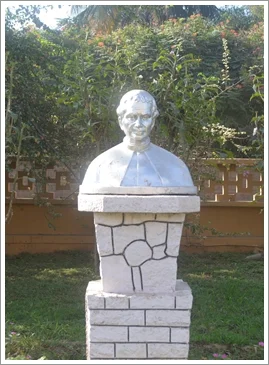St John Bosco, more commonly known as 'Don Bosco', is remembered as a man who dedicated his life
to the service of abandoned young people. He was born in a village called 'Becchi' in Italy in 1815.
When he was only two years of age he lost his father and was brought up by his mother, Mama Margaret.
Through a series of events in his youth, not least a very powerful dream he had as a young boy of nine,
he learned to become a leader for the young people he grew up with, many of whom were very badly behaved.
In order to relate to them he needed to develop certain skills. He learned that by combining entertainment
with teaching and praying he could achieve positive results. Entertained by his magical balancing act, the
young people would gladly listen to a lesson or pray with John Bosco. It inspired him to become a priest.
After many years of hardship and sacrifice, in 1841, just short of his 26th birthday, he was ordained a priest.
In Italy, priests are called 'Don' followed by their family name, so John Bosco became Don Bosco as we refer to him today.
Upon becoming a priest, Don Bosco realized how he needed to live out his vocation.
The Industrial Revolution was spreading into Northern Italy; there was a great deal
of poverty, desolation, turmoil and revolution on the streets of the city.
Young people had been abandoned and lived in hopelessness. In the face of such
situations he made his decision: "I must, by any available means, prevent
children ending up in these situations." He knew that education was the key
to helping these young people. He sought to teach them (many could only learn
after their day's work and not all wanted to), and to get fairer treatment for
them with their employers. He looked to help other young people who still slept
under bridges and on the streets. Even when they stole from him, as some did,
he never gave up hope. He never lost his confidence in youth. Don Bosco started
technical schools to educate the young people in skilled jobs like printing,
bookbinding and mechanics. In those days, these were the skills that would guarantee
better conditions and a better future for them. He also started Festive Oratories
(centers where children could gather on Sundays and holidays for study, recreation and prayer),
which, in fact, is the starting point of all the future endeavors of Don Bosco.
All this while, from his 'old boys' Don Bosco had been building up a Society of
men who would help him to develop and continue his work with the young.
In December 1859 these young men were formed into a simple society for this purpose.
In May 1862, 22 of them professed to form the Society of St. Francis de Sales.
In 1869 the society was officially recognized by the Catholic Church and are
known by the name 'Salesians of Don Bosco'. The Salesians are to be found
working throughout the world, in every continent, thousands of Priests and
Brothers who continue the mission of Don Bosco inspiring and animating huge
numbers of people who come in contact with them that form part of the great 'Salesian Movement'.
After a life of achieving so much for young people, Don Bosco died at dawn on the
31st of January 1888 at the age of 73. . Don Bosco was declared a Saint of the
Catholic Church on 1st April 1934. The Society he founded now numbers over
18,000 members working in 126 countries through 3,000 institutions.
In India alone, there are over 2,000 Salesians serving the educational
needs of our children through over 320 institutions scattered throughout the country.
Countless young men and women, well established in society living lives useful to
themselves and to their fellow-beings offer ceaseless thanks to Don Bosco for
having saved them from lives of crime and misery.

